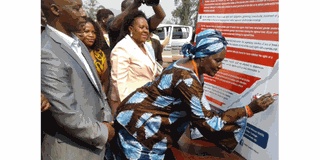Female traders eye borderless continental market

Former Trade Minister Ms Amelia Kyambadde signs a charter for Cross Border Traders. The charter advocates for fair treatment and professional handling of traders engaged in cross-border trade, particularly the women. Looking on is the then Trade Mark East Africa-Uganda country director Moses Sabiiti. PHOTO/ISMAIL MUSA LADU
What you need to know:
- The cross border women traders also want the regional governments to expedite the development and rehabilitation of high-capacity oil reserves to enable cushioning the economies against crises in the long term.
Cross border traders, majority of whom are women, “with immediate effect want the seven East African Community (EAC) member countries to roll out programmes that will help them smoothly transition from regional cross border traders to continental merchants.”
Over 60 per cent of businesses in the EAC bloc are small and medium enterprises, according to available official statistics.
“We specifically want the capacity of the small Women Cross Border Traders to be strengthened so that they are able to exploit the new markets in the African Continental Free Trade Area (AfCFTA),” said Ms Sheila Kawamara-Mishambi, the Executive Director for the Eastern Africa Sub-regional Support Initiative for the Advancement of Women (EASSI).
“Unless the small-scale traders are supported in terms of accessing credit and other trade facilitation, they are unlikely to compete favourably in lucrative markets such as the AfCFTA,” she added in a mid July 2022 statement.
The (AfCFTA) was launched in January 2021 as the biggest Free Trade Area in the world, bringing together Africa’s 55 countries with an expected combined Gross Domestic Product (GDP) of around $3.4 trillion. The Free Trade Area envisages free access to goods, services and labour across the continent through the creation of a single liberalized market.
The AfCFTA also aims at reducing tariffs among member states and covers policy areas such as trade facilitation and services as well as regulatory measures such as sanitary standards and technical barriers to trade. The AfCFTA came at a time when the East African Community (EAC) was marking 16 years existence of its Customs Union and 11 of the Common Market.
According to a recent EASSI analysis, “policy makers should build onto the achievements made by the EAC, such as the adoption of the Simplified Trade Regime (STR) that is specifically designed to enhance the participation of small-scale traders’ informal trade, who comprise majority of cross border traders in the region.”
The Simplified Trade Regime exempts import taxes on consignments below $2,000 originating from EAC. There has also been the progressive elimination of Non-Tariff Barriers (NTBs) and the introduction of One-Stop Border Posts (OSBPs) to further ease intra-regional trade.
“For the cross border traders to make the desired impact at the continental level their role will have to be negotiated and structured, something she said is of benefit to both parties –the cross border traders and the continent as a whole,” Ms Jane Seruwagi Nalunga, an expert on regional and continental trade and integration observed.
Other demands
The cross border women traders also want the regional governments to expedite the development and rehabilitation of high-capacity oil reserves to enable cushioning the economies against crises in the long term.
“This should be in addition to Instituting tax cuts on petroleum and petroleum products in the short run to curb the rapid changes in the pump prices, institute at national levels stimulus and stabilization fund for recovery of micro, small and medium enterprises among other things,” they said last week.





